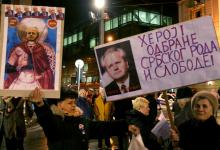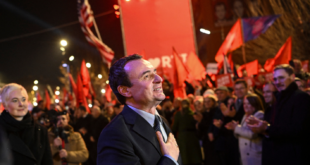 Some 1,000 hardline nationalists staged an anti-NATO rally in the main square of Belgrade, chanting “Kosovo is the heart of Serbia” and waving banners hailing Milosevic as the “hero of the Serbian nation.”
Some 1,000 hardline nationalists staged an anti-NATO rally in the main square of Belgrade, chanting “Kosovo is the heart of Serbia” and waving banners hailing Milosevic as the “hero of the Serbian nation.”
Earlier, air-raid sirens wailed and church bells tolled on Tuesday as Serbia marked the 10th anniversary of NATO’s air war to halt a violent crackdown on Kosovo by the then president Slobodan Milosevic.
People gathered at ceremonies by monuments to children and journalists killed in the NATO sorties as the sirens were sounded across the ex-Yugoslav republic for 60 seconds from midday (1100 GMT).
Later at the protests, among the speakers were Ramsey Clark, a former US attorney-general who served under US President Lyndon Johnson and former Russian general Leonid Ivashov.
Protestors, many of them shaven-headed youths dressed in football strips, shouted anti-NATO slogans, waving Serbian and Russian flags.
“Serbia-Russia, we do not need the Union (European Union),” one of the placards said.
A strong police presence was deployed in a bid to prevent riots by hardline nationalists, who had smashed Western-owned shops and McDonald’s restaurants during protests against Kosovo’s declaration of independence in February 2008.
Earlier, the bells of Orthodox churches tolled for the victims at 7:45 pm (1845 GMT), the moment NATO’s first attacks were launched 10 years ago.
“The attack on our country was illegal, contrary to international law, without a decision by the United Nations” Security Council, Prime Minister Mirko Cvetkovic told a special commemorative sitting of his cabinet.
“The air strikes have not solved problems in Kosovo, and did not help to bring peace and the rule of law,” he said, after schools held a minute’s silence before class.
Kosovo leaders however have said the NATO bombing stopped Serbian abuses in their breakaway territory.
“The 78 days of strikes saved the people of Kosovo from planned extermination, a scenario which was prepared coldly by the highest Serb political and academic circles,” Kosovo President Fatmir Sejdiu said.
Prime Minister Hashim Thaci described the bombing as “a big historic event for Kosovo and the democratic world” which “opened a new chapter in the history of Kosovo, a chapter of freedom.”
NATO launched the strikes on March 24, 1999 after Milosevic refused to agree to a peace deal to end his forces’ crackdown on the rebel Kosovo Liberation Army, KLA, and the ethnic Albanian majority in the southern territory.
It set out to destroy military targets, and went on to strike infrastructure and the Milosevic propaganda machine. But some strikes hit civilian sites and even the Chinese embassy in Belgrade.
After 78 days, Milosevic eventually conceded, paving the way for NATO to enter Kosovo, where some 15,000 NATO-led peacekeepers remain to this day.
Human Rights Watch put the civilian death toll from the bombing campaign at around 500.
But Milosevic’s government estimated the NATO strikes killed more than 1,000 soldiers and 2,500 civilians, including 89 children, and wounded 12,500 people.
European campaigners have since expressed concern about the health legacy of the NATO campaign, from the cluster bomblets still scattered across the country to the depleted uranium used in the missiles.
But many analysts argue the intervention was necessary to prevent a recurrence of events such as the 1995 Srebrenica massacre by Bosnian Serbs of some 8,000 Bosniaks (Bosnian Muslims), Europe’s worst atrocity since the Second World War.
Up to 9,000 people were killed in Kosovo’s 1998-1999 conflict, mostly ethnic Albanians.
 Eurasia Press & News
Eurasia Press & News



